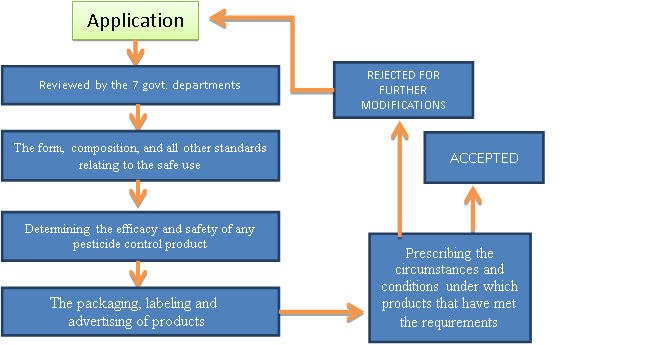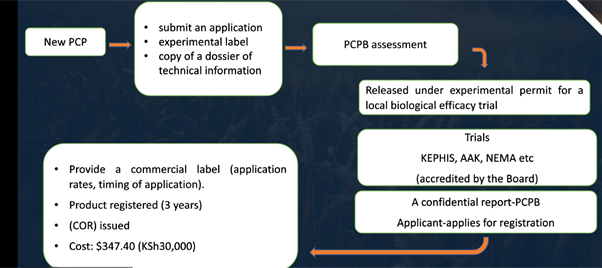Africa Reach Regulation for Various Sectors
The Department of Agriculture, Forestry and Fisheries (DAFF) is responsible for the registration of pesticides in South Africa. Pesticides are regulated under the Fertilizers, Farm Feeds, Agricultural Remedies and Stock Remedies Act, 1947 (Act No. 36 of 1947). In June 2019, after the reconfiguration of government departments, the agriculture function of DAFF was substituted by the Department of Agriculture, Land Reform and Rural Development.
Fertilizers and Farm Feeds Parliament approved the Agricultural Remedies and Stock Remedies Act in 1947, which regulates pesticides and their use, among other things. The Act has been changed several times since then, but it has never been comprehensively overhauled. Since the Act's establishment, the operations of the Department of Agriculture, Forestry, and Fisheries (DAFF), the entity that administers it, have not been subjected to public scrutiny. Furthermore, many of the over 3000 pesticides licensed for use in South Africa have not been re-evaluated in years.
The objectives of this Act are:
- To improve the legislative framework and ensure that South Africans are better protected from health and environmental risks posed by pesticides.
- To encourage the development and use of alternative products and techniques and reduce dependence on chemical plant protection products.
- To integrate relevant international agreements and initiatives from other government departments.
- Increased transparency, access to information and improved public participation in the registration of pesticides.
To register a pesticide product in South Africa, the applicant company must have a local legal entity to represent them.
A legal entity might be a person or a firm registered with the Department of Trade and Industry under the Company Act.
Pesticides are only allowed to be registered if they are approved to be effective, safe, and of high quality.
For oversea manufacturers, they should appoint an Authorized Representative (AR).
Registration consists of the following steps:
- Five batch analytical reports are used to verify chemical and toxicological equivalency.
- Data from a GLP (Good Laboratory Practice) approved independent laboratory is required.
- Details about the production.
- At least three biological efficacy data reports on local cockroach species have been completed. The South African Bureau of Standards (SABS) conducts such research in South Africa.
- The active ingredients and the formed product's chemical-physical data must also be submitted. All product specifications, such as data on storage stability, must be submitted.
- Details about how the product works, including the method of action.

The Department of Agriculture, Forestry, and Fisheries (DAFF) is responsible for ensuring that pesticides are appropriately labelled and that all information necessary for safe use is prominently displayed. Information should be given in such a way that a person can grasp the risks and acquire a sense of proportion to make an informed decision about whether those risks are acceptable. The labelling policy would be in line with the new Globally Harmonized System (GHS) of chemical classification and labelling.
The words "POISON EXTREMELY TOXIC" must appear in red letters no smaller than half the size of the product's name on a contracting background on the main panel of the label and the skull and crossbones; the second group requires the word "POISONOUS," and the third group requires the word "CAUTION" in a similar print. The least dangerous group does not require any toxicity information, but any indication that a product is possibly safe is permitted on the label or in promotional materials.
Toxic pesticide labelling is also subject to the regulations outlined in health law.
GPC can help you with:
- Identification of compliance requirements under various guidelines including all data requirements.
- Data gap analysis and pre-assessment support
- Technical documentation support
- Pre and post-submission support and technical liaison with authorities.
In Kenya, Pest Control Products Board (PCPB) is the pesticide management department, responsible for pesticide registration, controlling and managing pesticide, importing/ exporting, production, distribution, and application. The main pesticide regulation is the Pest Control Products (PCP) Act, Cap 346. Important Mandate of PCPB “Assessing the safety, efficacy, quality, merit and economic value of PCP with a view to approving them, if found suitable in local situation”.
All applications for consideration of approval of PCP must be accompanied by submission of risk assessment reports (2019/2021- Risk assessment workshops).
Risk assessment report needs to be submitted:
(1) During submission of summary dossier for new products.
(2) Upon completion of efficacy trials for label extension. Following conclusion of the local experimental efficacy trials.
Applicant will be required to provide detailed human (occupational and dietary) and environmental (Bees) risk assessment reports for all applications of new products and label extensions to ensure any PCP do not pose unacceptable risks (July 2021).

Applicants needs to provide the summary of risk assessment:
-
Quality of the data referenced for hazard assessment (e.g., Experimental design and quality of the critical study or studies).
-
Kenya Good agricultural practice (GAP) Table for efficacy and residue
-
Operator/Worker/Consumer exposure models and local risk assessment.
-
Bee exposure model and the local situation
-
The Input and output page of the exposure should be attached
-
Brief discussion of conclusion arising from the model’s output
-
Discussion on the proposed realistic pesticide risk management
PCPB controls the importation of pesticides through various registrations and licensing:
-
Agency licensing- pesticides manufacturers outside Kenya (validity, 1 year)
-
Product registration- pesticide products imported to Kenya (validity 3 years)
-
Premise licensing- premises handling pesticides (validity, 1 year)
-
Import permit
-
Import standardization mark (ISM)
-
Environmental protection
During the licence application process of importation or exportation of a pest control product for commercial purposes, applicants should specify its purpose such as “for resale”, “for manufacturing purpose” or “for importer’s own use”, etc.
-
Introductory fee of KS 10,000 to obtain an experimental permit.
-
A certificate of registration will cost the applicant $347.40 (KSh30, 000)
-
While a renewal certificate of registration not exceeding two years costs $231.60 (KSh20, 000)
-
Identification of compliance requirements under various guidelines including all data requirements.
-
Data gap analysis and pre-assessment support
-
Technical documentation support
-
Pre and post submission support and technical liaison with authorities.

 Twitter
Twitter
